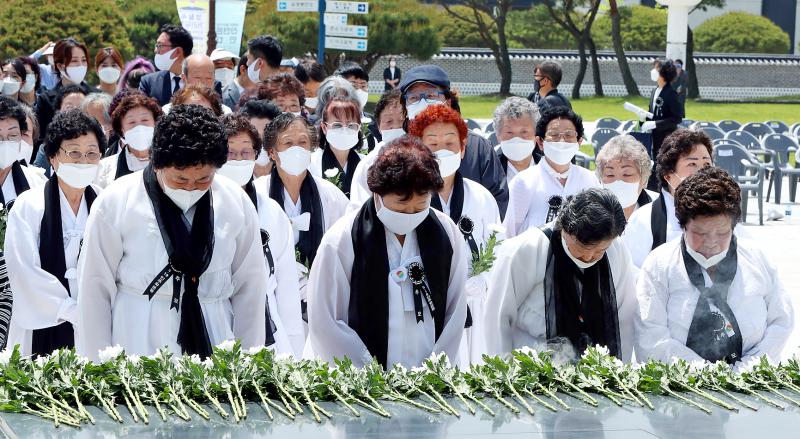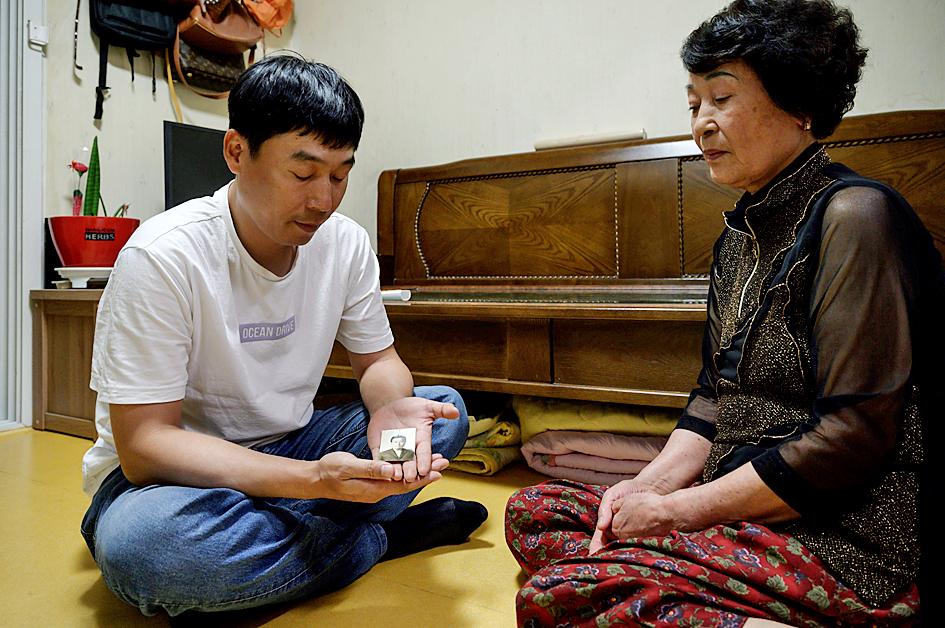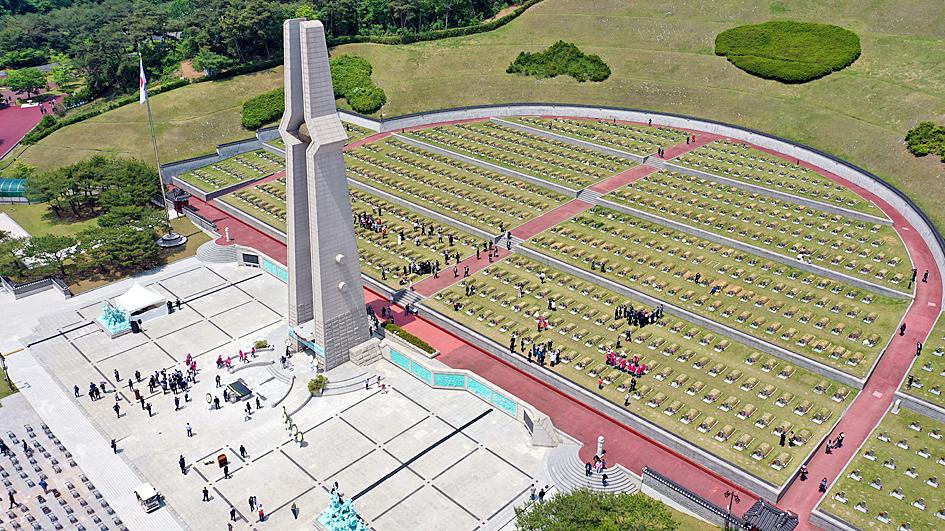It is 40 years since Choi Jung-ja saw her husband, who has been missing since South Korea’s military dictatorship killed hundreds of people when they crushed the pro-democracy Gwangju Uprising, a scar that burns in the country’s political psyche to this day.
On May 18, 1980, demonstrators protesting against then-South Korean president Chun Doo-hwan’s declaration of martial law confronted his troops and 10 days of violence ensued.
However, conservatives in the South still condemn the uprising as a communist-inspired rebellion backed by North Korea, while left-leaning South Korean President Moon Jae-in wants to enshrine it in the constitution.

Photo: EPA-EFE
Choi’s husband was 43 when he left their house in the southern city to buy oil for a heater at the family pub, never to return.
Once the violence was over Choi frantically searched for him, even opening random coffins in the streets covered with blood-stained Korean flags.
“I couldn’t continue after opening the third coffin,” she said. “The faces were covered with blood — there were no words to describe them. The faces were unrecognizable.”

Photo: AFP
She still takes medication to deal with the trauma, and curses whenever Chun appears on television, she said.
There is no agreed toll for Gwangju, with reports of secret burials on land and at sea. The military remaining in power for another eight years offered ample opportunity to dispose of the evidence.
Official bodies point to about 160 dead — including some soldiers and police — and more than 70 missing. Activists say up to three times as many may have been killed.

Photo: EPA-EFE
However, the search for justice has gone through multiple twists and turns and Gwangju is one of the most politicized historical events in a viciously polarized country.
At the time of the Gwangju Uprising, Chun’s military regime described it as a rebellion led by supporters of then-opposition leader Kim Dae-jung, who comes from nearby Sinan, and pro-Pyongyang agitators.
Kim was arrested, convicted of sedition and sentenced to death, but the penalty was commuted under international pressure and he was granted asylum in the US, before being elected president himself in the 1990s after the restoration of democracy and winning the 2000 Nobel Peace Prize.
Chun was convicted in 1996 of treason over Gwangju and bribery and condemned to hang, but his execution was commuted on appeal and he was released following a presidential pardon.
He still denies any direct involvement in the suppression of the uprising.
Today, Moon — who as a student took part in other anti-dictatorship protests — regularly highlights Gwangju, promising to reopen investigations into it and calling for it to be included in the constitution.
South Korea’s opposition seeks to paint Moon as a Pyongyang sympathizer, and Hannes Mosler of the University of Duisburg-Essen said the right sought to use Gwangju to discredit liberals by linking them to the “absolute evil” of the North.
“North Korea lies at the heart of polarization strategies in South Korea,” Mosler said. “Once a fake narrative is built around the Gwangju Uprising that connects it with North Korea, this provides the fuel for the polarization fire to burn further and further.”
Moon’s Democratic Par tlast month won a landslide election victory largely on the back of the government’s successful handling of the COVID-19 epidemic in the country.
While the city of Daegu was at the center of the outbreak, it is the last stronghold of the right and Moon’s party lost every one of the seats there.
The remains of about 40 people were discovered last year at the site of a former prison in Gwangju, where 242 relatives of missing people have given DNA samples in the hope of identifying corpses that have yet to come to light.
Among them is Cha Cho-gang, 81, whose son never returned after setting out to sell garlic at a market in the city, aged 19.
“My husband died three years ago,” she said. “His last wish was to bury our son’s remains before his own funeral.
“I have the same wish, but I don’t know if it will ever come true,” she added.

Airlines in Australia, Hong Kong, India, Malaysia and Singapore yesterday canceled flights to and from the Indonesian island of Bali, after a nearby volcano catapulted an ash tower into the sky. Australia’s Jetstar, Qantas and Virgin Australia all grounded flights after Mount Lewotobi Laki-Laki on Flores island spewed a 9km tower a day earlier. Malaysia Airlines, AirAsia, India’s IndiGo and Singapore’s Scoot also listed flights as canceled. “Volcanic ash poses a significant threat to safe operations of the aircraft in the vicinity of volcanic clouds,” AirAsia said as it announced several cancelations. Multiple eruptions from the 1,703m twin-peaked volcano in

Farmer Liu Bingyong used to make a tidy profit selling milk but is now leaking cash — hit by a dairy sector crisis that embodies several of China’s economic woes. Milk is not a traditional mainstay of Chinese diets, but the Chinese government has long pushed people to drink more, citing its health benefits. The country has expanded its dairy production capacity and imported vast numbers of cattle in recent years as Beijing pursues food self-sufficiency. However, chronically low consumption has left the market sloshing with unwanted milk — driving down prices and pushing farmers to the brink — while

China has built a land-based prototype nuclear reactor for a large surface warship, in the clearest sign yet Beijing is advancing toward producing the nation’s first nuclear-powered aircraft carrier, according to a new analysis of satellite imagery and Chinese government documents provided to The Associated Press. There have long been rumors that China is planning to build a nuclear-powered aircraft carrier, but the research by the Middlebury Institute of International Studies in California is the first to confirm it is working on a nuclear-powered propulsion system for a carrier-sized surface warship. Why is China’s pursuit of nuclear-powered carriers significant? China’s navy is already

‘SIGNS OF ESCALATION’: Russian forces have been aiming to capture Ukraine’s eastern Donbas province and have been capturing new villages as they move toward Pokrovsk Ukrainian Commander-in-Chief Oleksandr Syrskyi on Saturday said that Ukraine faced increasing difficulties in its fight against Moscow’s invasion as Russian forces advance and North Korean troops prepare to join the Kremlin’s campaign. Syrskyi, relating comments he made to a top US general, said outnumbered Ukrainian forces faced Russian attacks in key sectors of the more than two-and-a-half-year-old war with Russia. Ukrainian President Volodymyr Zelenskiy in a nightly address said that Ukraine’s military command was focused on defending around the town of Kurakhove — a target of Russia’s advances along with Pokrovsk, a logistical hub to the north. He decried strikes